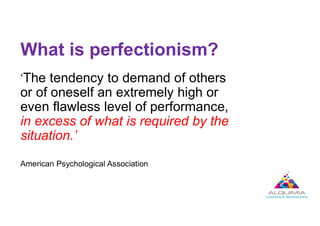How to ditch perfectionism
- 1. How to ditch perfectionism! 22 January 2020
- 2. Caveat • This presentation will look at perfectionism at work. • It assumes that you are mentally and physically well. • Its tips and advice are intended to help with everyday situations. • If you suffer from depression, OCD, anxiety or anything similar please seek help from your GP or appropriate mental health practitioner.
- 3. What isn’t perfectionism? • Wanting to improve • Pursuing excellence • Trying to do a good job • Wanting to be the best you can be • Learning and growing • Doing some jobs • brain surgeon, engineer…..
- 4. What is perfectionism? ‘The refusal to accept any standard short of perfection.’ google.com
- 5. What is perfectionism? ‘The tendency to demand of others or of oneself an extremely high or even flawless level of performance, in excess of what is required by the situation.’ American Psychological Association
- 6. What is perfectionism? ‘A trait that makes life an endless report card on accomplishments or looks. A fast and enduring track to unhappiness.’ Psychology Today
- 7. Why is it a problem? • It’s on the increase • It leads to: • Self-criticism, low self-confidence • Procrastination and delay • Avoiding challenges • Rigid thinking, lack of creativity • Frustration • Anxiety and depression • It never ends – vicious circle
- 8. Spotting a perfectionist at work • Great at their job, but just can’t see it • Incredible attention to detail • Checks and rechecks – work’s often late • Rules and rituals, set in their ways • Judgemental • Avoids risks, nervous • Or always on the move, changing jobs
- 9. Where does it come from? Perfectionism Family expectations or education Behavioural style or preferences Desire for control Social media or peer pressure Fear of failure or falling short Wanting to be liked
- 10. Managing your own perfectionism Deal with the fear 1. Identify it, dig deep • 5 whys or so what 2. Name it 3. Manage it Identify Name Manage
- 11. Practical tips • Clarify requirements • Set some parameters • define what’s good enough • set a timer • Check in/feedback • Re-evaluate standards • Get called out • Develop a growth mindset
- 12. Managing a perfectionist • Work out what their fear is • Keep them safe • Be clear and consistent • Parameters, expectations, standards • Check in • Reassure them • Help them see they’re valued even when they get things wrong
- 13. Wrap up • Perfectionism is not wanting to excel/improve • It is an excessive need to be flawless • It’s often derived from fear: • humiliation, making a mistake, being disliked • Go for good enough: 80/20 rule • Benchmark your standards against a reasonable person • Work on a growth mindset • Talk to someone
- 14. To book a strategy session Go to: https://calendly.com/jackiefitzgerald/strategy-session
- 15. Contact Information Written and presented by Jackie Fitzgerald e: jackie@alquimia.co.uk To book a free strategy session go to: https://calendly.com/jackiefitzgerald/strategy-session t: 01235 861 311 m: 07833 478 761 twitter: @jackiealquimia All slides © Jackie Fitzgerald 2020















